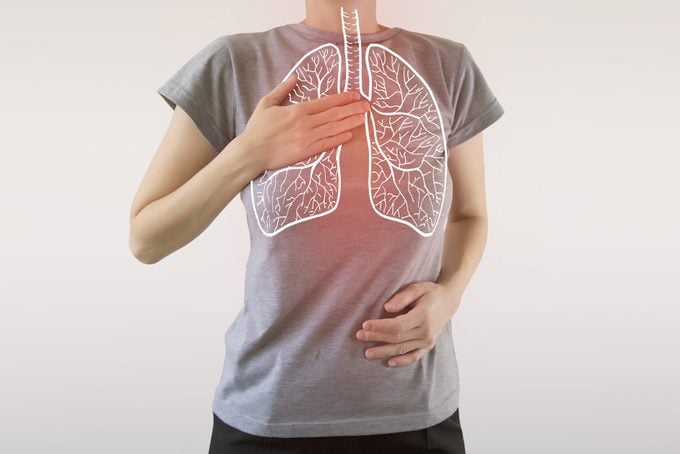I Got Whooping Cough at 32—Now I Have Lung Damage
Updated: Aug. 21, 2023
Coughing fits, fatigue, and dizziness led to one person's whooping cough diagnosis at age 32. Now they're living with permanent lung damage.
Whooping cough in adults
It may not be the first disease you think of when you hear someone cough (these days, that’s bound to be Covid-19), but pertussis is a highly contagious illness known for a cough that won’t quit. It’s caused by Bordetella pertussis bacteria, which can release toxins into the airways. You may recognize it by its nickname, whooping cough—a nod to the whooping noise people make as they struggle for breath. Early symptoms include a runny nose, fever, and slight cough. As the condition worsens, symptoms may also include exhaustion, sleep problems, and coughing fits that can be so severe they cause vomiting. There is a pertussis vaccine available that is very effective in preventing the disease. Whooping cough is more likely to cause serious illness or death in children and babies, but people of any age can get pertussis and suffer severe consequences. Bonnie B., 37, of Memphis, Tennessee, got whooping cough at age 32. Here, they share their harrowing story of how a typical cough turned into a permanently disabling condition.
Symptoms spiraling out of control
February 2016 was a busy time for me. I was trying to schedule a surgery and move at the same time, so I was annoyed when I came down with what I thought was the flu.
My symptoms started with a fever and a “normal” cough, similar to one I had when I had bronchitis previously. My doctor agreed and told me to drink more water and take cough medicine to get through the worst of it, which we assumed would be a few weeks at most. We decided to delay my surgery until I could stop coughing.
Yet despite trying every cough remedy in the drug store, my cough got worse instead of better—much worse. By March, it was to the point where I had constant coughing fits, could barely catch my breath, and couldn’t move very much because I lost air so quickly.
I realized how bad it had become when I was trying to move a lot of my stuff out of storage.
My symptoms went beyond coughing fits. I was dizzy, my heart was racing, my hands and feet felt numb, and I was utterly exhausted, far beyond what I’d expect for that kind of work. (Unusual fatigue is one of the telltale whooping cough symptoms.)
I was coughing so much I was having “air hunger,” a terrifying sensation of desperately needing to breathe but not being able to get enough air in no matter how hard I tried. The air hunger caused me to hyperventilate, which caused even more coughing fits. It was a vicious cycle.
The coughing fits affected every aspect of my life. I couldn’t eat. I couldn’t sleep. It was all I could do to get through the most basic functions in my life.
I started to wear a mask all the time because it seemed to help a little with the coughing fits.

Getting whooping cough as an adult
Finally, after dealing with these symptoms for two months, I made an appointment with my doctor.
I got a full examination and had X-rays done of my lungs, but nothing immediately stood out. I was negative for both influenza and strep, I had no fluid in my lungs, and my sinuses were clear.
The only indicator that there was something physically wrong was the swelling of my bronchial tubes because of all the irritation.
By that point, my cough sounded exactly the way recorded whooping cough videos sound, except somehow worse, likely because I’d had it for so long. Every breath was a raspy gasp, with as much intake as I could stand before the next coughing fit began.
Because I had been fully vaccinated as a child and it’s relatively rare in adults in the United States, pertussis wasn’t anyone’s first thought. But after ruling out everything else, they finally tested me.
It came back positive. I had whooping cough.
(Get to know pertussis vaccines: Tdap vs. DTaP.)
Treating my whooping cough symptoms
There’s not a lot they can do to treat pertussis other than manage symptoms. The doctor prescribed me some codeine syrup, gave me a pertussis booster shot, and scheduled a check-up after a week.
The codeine syrup did nothing and my cough continued to get worse. I was then prescribed a steroid inhaler to help keep my airways open and an EpiPen, in case one of the coughing fits caused my windpipe to close. It was a terrifying way to live! But there wasn’t much else I could do but try to take care of my body and be patient while it recovered.
It was just the beginning of a six-month nightmare that would change my life forever.
(Here’s more information on pertussis treatment for adults and children.)
It’s not “just a cough”
When I got the diagnosis, I was really, really angry. Whooping cough isn’t supposed to be a concern for adults in America. Up until recently, the vaccine had almost eradicated it.
But the anti-vax movement took hold in the early 1990s, and now cases are rising.
I don’t know exactly how I got whooping cough, but it was likely a combination of my childhood vaccine immunity waning and an unvaccinated person who didn’t realize they had it infecting me. Which is why it’s so important for all adults to take pertussis precautions to stop the spread of this devastating illness.
There is so much misinformation about both vaccines and pertussis. Many people like to claim that the vaccine causes autism (it doesn’t) and that if you do get sick as an adult, it’s “just a little cough.” I can tell you from personal experience it’s not just a little cough!
That “little” cough lasted for six months, until about August 2016, and it affected everything else in my body, as breathing tends to do.
My blood pressure and heart rate skyrocketed. I had anxiety and insomnia, chronic headaches, and I couldn’t eat much. Everything ached.
The coughing fits were so severe that my back would seize up, and I actually dislocated some of my ribs. I was in constant pain. There were times when I was so weak from coughing that I needed to use a wheelchair.
Living with permanent lung damage
After the coughing fits finally stopped, I was officially “over” whooping cough, but it left damage that’s still affecting me.
My lungs are permanently scarred, which makes me extra sensitive to airborne irritants and compromises my breathing. The damage also makes my lungs easily irritated, so I continue to get dry coughs that can last for weeks.
My doctor says that while it’s pretty bad, there’s nothing I can do about it except ride it out and make sure I stay hydrated. I’ll likely always have to carry inhalers and EpiPens.
Get your Tdap vaccine booster
These days, I tell everyone to get their Tdap (tetanus, diphtheria, and pertussis) vaccine booster because while the condition may start out as “just a cough,” it can snowball to the point where you feel like you are going to suffocate to death.
This illness is no joke, and it doesn’t just affect babies and children. I was 32 years old when I got it. I couldn’t work or concentrate. It robbed me of activities I’d previously took joy in.
The symptoms can last for months or even a year or more. I’m told that I’m one of the lucky ones since my case of whooping cough only lasted for six months.
There are an average of 24 million cases and 167,000 deaths from pertussis worldwide each year. All are unnecessary—an effective vaccine exists.
As someone who was part of that statistic, I want to tell everyone: Don’t believe the lies on the Internet about vaccines. Get your booster shots.
—As told to Charlotte Hilton Andersen

















